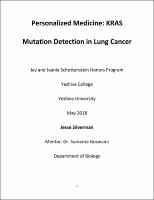Please use this identifier to cite or link to this item:
https://hdl.handle.net/20.500.12202/4349| Title: | Personalized Medicine: KRAS Mutation Detenction in Lung Cancer. |
| Other Titles: | Thesis submitted in partial fulfillment of the requirements of the Jay and Jeanie Schottenstein Honors Program, Yeshiva College, Yeshiva University, May 2018. |
| Authors: | Silverman, Jesse |
| Keywords: | KRAS mutation detection personalized medicine lung cancer |
| Issue Date: | May-2018 |
| Publisher: | Yeshiva College. Yeshiva University. |
| Citation: | Personalized Medicine: KRAS Mutation Detenction in Lung Cancer. Silverman, Jesse. Thesis submitted in partial fulfillment of the requirements of the Jay and Jeanie Schottenstein Honors Program, Yeshiva College, Yeshiva University, May 2018. |
| Abstract: | General Abstract: --------- With relatively non-unique and often overlooked symptoms, lung cancer can often progress undiagnosed until its later stages. At this point, the cancer is inoperable, and a sufficient biopsy cannot be taken. For both men and women, Lung Cancer is the leading cause of cancer death in the US with an estimated 234,030 new cases and 154,050 deaths in 2018. There are over 430,000 people currently living that have been diagnosed with lung cancer in their lifetime. Excluding skin cancer, Lung cancer is the second most common cancer in men behind Prostate Cancer and in women behind breast cancer.1 Today, physicians are taking advantage of personalized medicine to treat cancer patients. With molecular diagnostics, accurate drugs can be prescribed, and sweeping treatments such as chemotherapy do not have to be solely relied on. My project investigates a method in which physicians can use a small biopsy, attainable even in lung cancer’s later stages, to accurately detect which mutation is causing a cancer and consequently prescribe appropriate drugs. With the success of this method and those like it, cancer treatment can be individually catered, leading to more success and minimal collateral damage. ---------------------- Scientific Abstract: ---------------------- As time moves on, the number of drugs available for cancer treatment is growing rapidly. Using molecular diagnostics, physicians can identify which mutations are present in a growing cancer and can prescribe a drug or combination of drugs that target specific mutations or their downstream effects. In this way, a cancer is treated at its core and healthy cells are left unharmed. This is a far more effective and beneficial approach than what has been the standard of cancer treatment thus far. Treatments such as chemotherapy target all cells and devastate the body. For this reason, it is vital that physicians be provided with methods to detect exactly which mutations must be addressed. In the late stages of lung cancer, this is a difficult task as the tumor is inoperable. My project seeks to utilize the small number of cells obtained from Fine Needle Aspiration (FNA) to detect the presence of mutations at specific sights in the DNA and determine exactly what the base pair change is. To detect specific DNA mutations in the KRAS gene of lung cancer, we extracted DNA from patient samples obtained from pathologists. After performing real-time polymerase chain reactions to amplify the DNA, we used specifically designed XNA primers for further amplification. XNA is like DNA except that it binds much more tightly to DNA thereby inhibiting amplification in PCR. DNA with no mutation was expected to have minimal amplification, while DNA with a mutation was expected to amplify more, as the XNA would bind less tightly. Results proved the method to be successful in detecting the presence of a mutation. Next, DNA was sent for sequencing to confirm the exact base pair change. My project was successful in determining the presence and type of mutation on the 12th codon of the KRAS gene, corresponding to the G12 amino acid in lung cancer tumors. Future work will extend the method to G13 and Q61 amino acids of the KRAS protein as well as mutations in many other genes and in different cancer types. |
| Description: | The file is restricted for YU community access only. Mentor: Dr. Sumanta Goswami, Department of Biology |
| URI: | https://hdl.handle.net/20.500.12202/4349 https://ezproxy.yu.edu/login?url=https://repository.yu.edu/handle/20.500.12202/4349 |
| Appears in Collections: | Jay and Jeanie Schottenstein Honors Student Theses |
Files in This Item:
| File | Description | Size | Format | |
|---|---|---|---|---|
| Jesse Silverman Senior Honors Thesis 2018.pdf Restricted Access | PDF Rynhold OCR | 411.2 kB | Adobe PDF |  View/Open |
This item is licensed under a Creative Commons License

